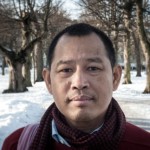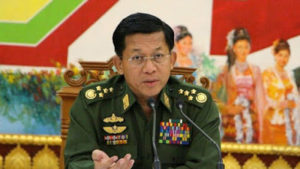Why and in What Ways Is Myanmar Military Protecting Buddhism and Buddhist ‘Race’?
TRANSCEND MEMBERS, 27 Jun 2016
Maung Zarni – TRANSCEND Media Service
 Why does Myanmar Tatmadaw intend to protect “Buddhism” and “Bama race”? And in what specific ways do the military strategists “protect” Buddhism?
Why does Myanmar Tatmadaw intend to protect “Buddhism” and “Bama race”? And in what specific ways do the military strategists “protect” Buddhism?
25 Jun 2016 – Now Myanmar is officially a Fascist State, with the military claiming itself as the protector of Buddhism and Race: Aung San Suu Kyi is crippled, intellectually and strategically.
Myanmar Armed Forces led by monk-killers – remember the Saffron Revolt of 2007 ? – has been using Buddhism as a strategic tool for the following four goals:
- divert public attention away from the discourses of human rights
- create the pretext of the need for a strong hand, which in turns conceals its plan to stay in power indefinitely by injecting a sense of fear, insecurity and disunity within the society at large;
- derail any remotely democratic program and push by the NLD; and since 2011
- discredit, undermine and diminish Aung San Suu Kyi’s leadership.
Myanmar’s Ma-Aa-La military chief officially claiming to protect a religion vis-a-vis all the other faiths – in the case of ideologically and intellectual backward Burma or Myanmar, religion and ethnicity are seen as inseparable – spells more troubles for the country.
I have always KNOWN that the military is the hidden hand behind all the religious tensions and violence, in ways that both covert and overt.
Destabilizing and disuniting the society is a Win-Win strategy for the institution that had long – and officially – identified the two other influential above-ground, non-military national institutions as the greatest threats to the military’s attempt to monopolize state power in its hand, namely the Sangha or Buddhist Order and (politically conscious) university student bodies across the country.
In the last 50 years, the military has deviced various strategies to effectively control these institutions. Its strategies include brutal crackdowns, implanting hundreds of intelligence moles in both student bodies and monastic communities, enticing the corruptible senior monks with sweateners, structural mechanisms (such as the splitting up of large academic institutions and instituting ‘Sangha Purification’ – really IDing and administering monk bodies), coopting ambitious university academics, coercing monks and academics to serve as surveillance monitors on their pupils and disciples, using influential monks and academics as the military’s mouthpieces, etc.
Snr Gen Min Aung Hlaing pledges to help safeguard Buddhism
By Wa Lone, Myanmar Times | Friday, 24 June 2016
Myanmar’s Commander-in-chief Senior Gen. Min Aung Hlaing speaks during a ceremony to mark the 70th anniversary of Armed Forces Day in Naypyitaw, Myanmar, Friday, March 27, 2015. Myanmar’s powerful army commander has pledged to work to support successful elections in November and warned that the army will not tolerate instability or armed threats. (AP Photo/Khin Maung Win)Snr Gen Min Aung Hlaing Amid the government’s efforts to arrange peace talks, and an ongoing controversy over terminology for religious minorities in Rakhine State, Commander-in-Chief Senior General Min Aung Hlaing said the Tatmadaw would help shoulder the burden of protecting Myanmar’s predominantly Buddhist character.
In a speech to recruits at the military’s Officer Training School in Bahtoo, Shan State, on June 21, Snr Gen Min Aung Hlaing noted Myanmar’s majority Buddhist demographics, pledging to safeguard that religious heritage for future generations.
The comments, reported in the military-owned Myawady newspaper, come as the government grapples with the sensitive topic of how to refer to the Muslim community that self-identifies as Rohingya, as well as prepares to undertake peace negotiations with a handful of ethnic armed groups that identify as Christian.
The senior general insisted that the military’s pro-Buddhist stance did not constitute religious extremism.
Political analysts and rights groups, however, have questioned the timing of the remarks.
U Than Soe Naing, a political analyst, speculated that the Tatmadaw leader chose his words as a calculated attempt to distinguish the powerful institution that he heads from the new civilian government led by Daw Aung San Suu Kyi.
“I believe that the Tatmadaw putting forward this opinion will tend to lead to a bad outcome,” he told The Myanmar Times, pointing to the peace process that Daw Aung San Suu Kyi is attempting to jumpstart. Herself a Buddhist, the state counsellor has emphasised inclusivity as one of her government’s peace priorities.
Some of the ethnic armed groups involved in the negotiations are majority-Christian, while the Tatmadaw leadership and rank-and-file largely reflect the country’s overall Buddhist majority, which estimates put at 85 to 90 percent.
Ethnic minorities have long accused the military of harbouring bias against them, in part the product of decades of Tatmadaw offensives and human rights abuses in areas inhabited largely by Christians.
Pado Saw Kwel Htoo Win, secretary of the Karen National Union, said the notion that Myanmar is a “Buddhist country” – advocated strongly by its first post-independence prime minister, U Nu – was one reason anti-government insurgencies proliferated over the years.
“We already have experiences of suffering long-term civil war because of a lack of equal rights between the majority and minorities,” he said.
He added that future political dialogue should focus not on enshrining Buddhism’s pre-eminence, but instead on guaranteeing equal rights for all within a federal state.
He said a discussion would need to be had about whether the commander-in-chief was speaking of a Tatmadaw policy that would be put down on paper or was merely expressing his personal opinion.
For Muslims, the statement’s implications are different but related. There are no ethnic armed groups in Myanmar that identify as Islamic, but communal violence between Muslims and Buddhists has flared in recent years, most notably in Rakhine State in 2012.
There, where more than 100,000 people self-identifying as Rohingya were displaced by the unrest, Daw Aung San Suu Kyi has formed a committee tasked with improving the situation for all the state’s residents. Terminology has arisen as a flashpoint in recent weeks, however, with Buddhist nationalists insisting that Muslims in Rakhine State be called “Bengali,” while the international community advocates the right to self-identify.
The new government has sought to chart a middle course on the matter, opting to describe the group as “the Muslim community from Rakhine State”. Much of the tension in Rakhine State stems from fears among its Rakhine Buddhists that their identity is under threat from Islam.
U Thopaka, a member of the Committee for the Protection of Race and Religion, better known as Ma Ba Tha, told The Myanmar Times that Snr Gen Min Aung Hlaing had his full support, adding that such safeguarding should be the duty of “everyone”, including the government.
“You have to know how to maintain and protect your race and religion as a Buddhist,” he said.
U Aung Myo Min, director of Equality Myanmar, said the Tatmadaw has a responsibility to protect every citizen, regardless of race or religion.
“I think the Tamadaw shouldn’t voice such kind of opinion, which increases hate and distrust among the people,” he said.
U Yan Myo Thein, another political analyst, said given the Tatmadaw’s critical role in the peace process, its leader should adopt a more broad-minded approach.
“The military leaders need to accept that the only way they can overcome the deadlock of the country’s peace process is to be all-inclusive,” he said.
Critics might also find irony in Snr Gen Min Aung Hlaing’s additional pledge that the military, in addition to Buddhism, would help protect the nation’s natural resources. Many accuse previous military and quasi-civilian governments of selling off much of Myanmar’s resource endowment for personal enrichment.
__________________________________
Dr. Maung Zarni is a Burmese activist blogger, Associate Fellow at the University of Malaya, a member of the TRANSCEND Network for Peace, Development and Environment, founder and director of the Free Burma Coalition (1995-2004), a visiting fellow (2011-13) at the Civil Society and Human Security Research Unit, London School of Economics, and a nonresident scholar with the Sleuk Rith Institute in Cambodia. His forthcoming book on Burma will be published by Yale University Press. He was educated in the US where he lived and worked for 17 years.
Go to Original – maungzarni.net
DISCLAIMER: The statements, views and opinions expressed in pieces republished here are solely those of the authors and do not necessarily represent those of TMS. In accordance with title 17 U.S.C. section 107, this material is distributed without profit to those who have expressed a prior interest in receiving the included information for research and educational purposes. TMS has no affiliation whatsoever with the originator of this article nor is TMS endorsed or sponsored by the originator. “GO TO ORIGINAL” links are provided as a convenience to our readers and allow for verification of authenticity. However, as originating pages are often updated by their originating host sites, the versions posted may not match the versions our readers view when clicking the “GO TO ORIGINAL” links. This site contains copyrighted material the use of which has not always been specifically authorized by the copyright owner. We are making such material available in our efforts to advance understanding of environmental, political, human rights, economic, democracy, scientific, and social justice issues, etc. We believe this constitutes a ‘fair use’ of any such copyrighted material as provided for in section 107 of the US Copyright Law. In accordance with Title 17 U.S.C. Section 107, the material on this site is distributed without profit to those who have expressed a prior interest in receiving the included information for research and educational purposes. For more information go to: http://www.law.cornell.edu/uscode/17/107.shtml. If you wish to use copyrighted material from this site for purposes of your own that go beyond ‘fair use’, you must obtain permission from the copyright owner.
